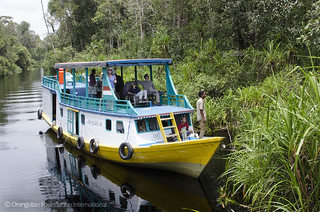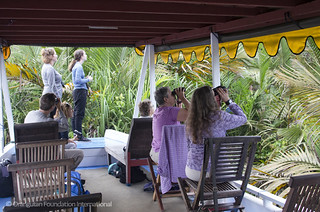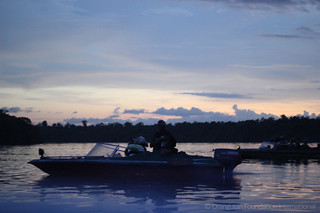“Into the Wild”
 Irene Spencer means business. “Everyone have a seat cushion?” trills her distinct east-coast American accent. Irene is directing guests to various vehicles under a lightening Bornean sky. In general she is concerned about her guests’ comfort. Today specifically, it is the comfort of their behinds. “It’s a bumpy ride,” she states, “but you won’t forget it!”
Irene Spencer means business. “Everyone have a seat cushion?” trills her distinct east-coast American accent. Irene is directing guests to various vehicles under a lightening Bornean sky. In general she is concerned about her guests’ comfort. Today specifically, it is the comfort of their behinds. “It’s a bumpy ride,” she states, “but you won’t forget it!”
Twice a year, travelers collect in a spacious hotel lobby in Central Kalimantan, bleary-eyed from travelling from all corners of the world. Yet the tang of excitement is always unmistakable on these mornings. The Orangutan Foundation International (OFI) eco-tours are now in full swing, and Irene is ready.
Meeting Ms. Spencer is an experience unto itself. Her upright stance and deliberate movements recall a dormant volcano – languid but with activity bubbling just beneath the surface. Her blonde flowing hair and twinkling gaze draw the eye. Irene has the easy air of someone who has done this many times before. In other words, she is just the type of person you want guiding you through the twisting swamp forests of Central Borneo. Unsurprisingly, she has crisscrossed the globe long before frequent flyer miles were an international obsession. To date, she has visited 140 countries and has been in the travel business for 28 years. “I always had wanderlust,” she says “My father was an armchair traveller, but my mother always wanted to know what was around the corner. When she was 92, she went on a cruise to Alaska. She was interested in the world. I think I inherited that from her.”
People travel for a reason. Sometimes, they expect to escape. Often, they want to be inspired. Rarely, do they expect to be awestruck. Yet Irene often sees this happen on OFI’s eco-tours. When she talks about Borneo’s Tanjung Puting National Park, her voice changes. She easily recalls the vistas that beckon her to Borneo biannually. This year she considered cancelling her eco-tours in autumn, in favor of relaxation. Now that she is back, the absurdity of that decision is weighing on her, as she would have had to spend a whole year without seeing orangutans. Their survival as species and their welfare truly matter to her. She answers quickly when asked what else brings her back to Borneo. “Bringing joy and fulfilling people’s dreams. To bring wonderment to people, to get to see their reactions when orangutans come in from the trees; their expressions when they see the babies.” The uniqueness of this place still affects her, even after accompanying groups for 14 years. She admits that her interest in the generic travel industry has waned. She roamed for years wherever her heart led her, but she now returns to the Bornean jungles where her heart dwells.
 It is not only Irene who is moved by the notion of being close to the “red ape.” Repeat visitors are common on her eco-tours. “People on the tours say that they have been obsessed with orangutans since they were children. For these people to actually visit orangutans as adults, it is really incredible for me to watch. Some of them cry. I see tears streaming down their face with expressions like ‘I can’t believe this is happening to me.’ That’s what it’s all about.” With passion, Irene singles out the educational value of these tours. Visitors often remark to her how surprised and delighted they are to spend time with Orangutan Foundation International’s Founder, Dr. Birute Mary Galdikas. “Seeing the orangutans with her is like seeing the chimps with Jane Goodall, totally different. When she is there, the orangutans all come. They greet each other and us as old friends.” Irene has managed to forge special bonds with a few orangutans herself, visiting them repeatedly over the years. Visitors witnessing the closeness these two women have with their simian relatives are often taken aback. It recalls a primeval bond that many of us have forgotten, but not completely erased.
It is not only Irene who is moved by the notion of being close to the “red ape.” Repeat visitors are common on her eco-tours. “People on the tours say that they have been obsessed with orangutans since they were children. For these people to actually visit orangutans as adults, it is really incredible for me to watch. Some of them cry. I see tears streaming down their face with expressions like ‘I can’t believe this is happening to me.’ That’s what it’s all about.” With passion, Irene singles out the educational value of these tours. Visitors often remark to her how surprised and delighted they are to spend time with Orangutan Foundation International’s Founder, Dr. Birute Mary Galdikas. “Seeing the orangutans with her is like seeing the chimps with Jane Goodall, totally different. When she is there, the orangutans all come. They greet each other and us as old friends.” Irene has managed to forge special bonds with a few orangutans herself, visiting them repeatedly over the years. Visitors witnessing the closeness these two women have with their simian relatives are often taken aback. It recalls a primeval bond that many of us have forgotten, but not completely erased.
So what kind of person does it take to have a quasi-religious experience like this? Travelling to Borneo can bring to mind outrunning exotic predators and wading through waist-deep swamps. Thankfully, times have changed. “If you can walk, you can do this trip,” says Irene. Boat trips and gentle walks are the limits of exertion on her eco-tours. She acknowledges the facilities can be basic, with characteristic mirth. “I ask people ‘have you been to Africa? Yes? Well, this isn’t Africa!” She is referring to luxury “camping” experiences offered on many African reserves. Tossing her steel-colored hair, Irene mulls over the payoffs of having the bare necessities while in the jungle. Certainly, there are fewer partitions between human and nature. For those seeking their sacred experience without the fuss, the eco-tours would be the perfect bridge.
 Simplicity can cast a potent spell. Back in Borneo, the sky fades to lavender and indigo as the small boat cuts through the Sekonyer River. Irene has been orchestrating and chatting the entire day. Frenzied activity has melted away into this final moment of silence. Unaware that she is being watched, she props her arm on the edge of the speedboat and leans into it. Her chin tilts back slightly as a staggering panorama unfolds. Glassy water catches the fading light and lush trees on the riverbanks darken to ghostly black. The forest is ever watchful; awake with nocturnal life. A small smile plays on her lips. Irene may live for the astonishment on visitors’ faces, but perhaps she has not realized their joy is a mirror of her own.
Simplicity can cast a potent spell. Back in Borneo, the sky fades to lavender and indigo as the small boat cuts through the Sekonyer River. Irene has been orchestrating and chatting the entire day. Frenzied activity has melted away into this final moment of silence. Unaware that she is being watched, she props her arm on the edge of the speedboat and leans into it. Her chin tilts back slightly as a staggering panorama unfolds. Glassy water catches the fading light and lush trees on the riverbanks darken to ghostly black. The forest is ever watchful; awake with nocturnal life. A small smile plays on her lips. Irene may live for the astonishment on visitors’ faces, but perhaps she has not realized their joy is a mirror of her own.





